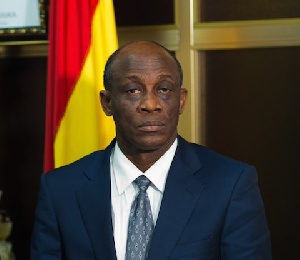 Finance Minister - Seth Terkper
Finance Minister - Seth Terkper
Forbes has ranked Ghana 79th among 144 countries as far as doing business is concerned. The cocoa-, gold-, and oil-producing West African country also came 8th among the 40 African countries captured in the ranking.
African countries like Senegal, Tunisia, Namibia, the Seychelles, Mozambique, Lesotho, Madagascar, Burkina Faso and Cote d’Ivoire were all behind Ghana in the ranking, while Mauritius, South Africa, Morocco, Botswana, Cape Verde, Rwanda and Zambia were ahead of the former British colony.
Ghana’s scores for specific factors based on which the ranking was done are as follows: Trade Freedom, 12; Monetary Freedom, 123; Property Rights, 49; Innovation, 65; Technology, 96; Red Tape, 83; Investor Protection, 63; Corruption, 55; Personal Freedom, 35; Tax Burden, 84; Market Performance, 74.
Also, the macroeconomic indicators and demographics used by Forbes are as follows: GDP Growth: 4%, GDP per Capita: $4,100, Trade Balance/GDP: -10.4%, Population: 26.3M, Public Debt/GDP: 71%, Unemployment: 5.2% and Inflation: 15.5%.
According to Forbes, “Ghana's economy was strengthened by a quarter century of relatively sound management, a competitive business environment, and sustained reductions in poverty levels, but in recent years has suffered the consequences of loose fiscal policy, high budget and current account deficits, and a depreciating currency.”
It said Ghana has a market-based economy with relatively few policy barriers to trade and investment in comparison with other countries in the region.
“Ghana is well-endowed with natural resources. Agriculture accounts for nearly one-quarter of GDP and employs more than half of the workforce, mainly small landholders,” Forbes added in a profile.
Forbes said the services sector accounts for about half of GDP.
“Gold and cocoa exports, and individual remittances, are major sources of foreign exchange. Expansion of Ghana’s nascent oil industry has boosted economic growth, but the recent oil price crash has reduced by half Ghana’s 2015 anticipated oil revenue. Production at Jubilee, Ghana's offshore oil field, began in mid-December 2010 and currently produces roughly 110,000 barrels per day.
“The country’s first gas processing plant at Atubao is also producing natural gas from the Jubilee field, providing power to several of Ghana’s thermal power plants. As of 2015, the biggest single economic issue is the lack of consistent electricity.
“While the Mahama administration is taking steps to improve the situation, it will be the third or fourth quarter of 2015 before any relief is visible. Ghana signed a $920 million extended credit facility with the IMF in April 2015 to help it address its growing economic crisis.
“The IMF fiscal targets will require Ghana to reduce the fiscal deficit by cutting subsidies, decreasing the bloated public sector wage bill, strengthening revenue administration, and increasing revenues. The challenge for Ghana will come as the Mahama administration approaches the 2016 election cycle facing public dissatisfaction in the midst of economic austerity,” Forbes noted.
Africa’s most populous country, Nigeria, which has a population of 181.6 million, was ranked 122nd among the 144 countries, but came 27th in Africa. Nigeria, which is also Africa’s biggest economy, has its GDP growth put at 6.3 per cent, GDP per capita, $6,100; and trade balance to GDP, 0.2 per cent.
Denmark, with a population of 5.6 million took the number one spot, with 1.1 per cent GDP growth, $44,600 GDP per capita and trade balance to GDP of 6.3 per cent.
At the bottom of the ranking is Chad. Forbes quotes that country’s GDP growth rate as 6.9 per cent, GDP per capita as $2,600 and trade balance to GDP as -7.8 per cent. Chad has a population of with a population of 11.6 million.
At the top of the ranking, as far as Africa is concerned is Mauritius, with a population of 1.3 million. It has a GDP per capita of $18, 700, a trade balance to GDP of -5.5 per cent and GDP growth of 3.6 per cent.